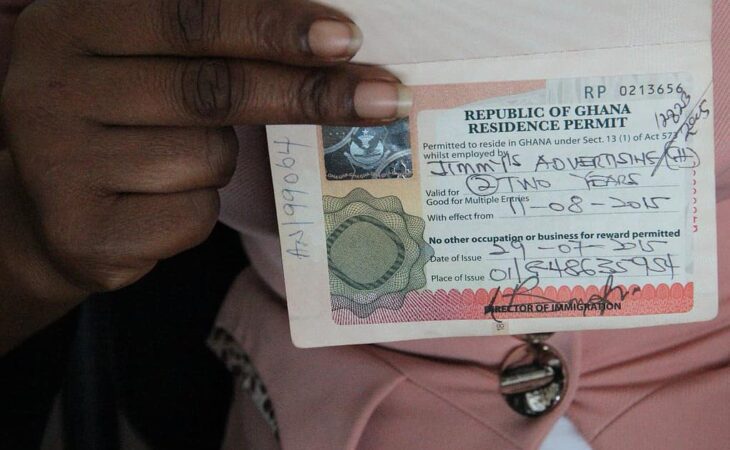
Ghana is a beautiful and thriving country in West Africa, and many foreigners are drawn to its unique culture, hospitable people, and business opportunities. If you are a foreigner looking to work or live in Ghana, it is important to obtain a work and residence permit. This guide will provide you with a complete overview of the process of applying for a work permit, the types of permits available and who qualifies to apply, the required documents, and the post-application process.
A work and residence permit is an essential legal document that allows foreigners to legally live and work in Ghana.
Obtaining a work and residence permit in Ghana can be a challenging process for foreigners due to various factors. One of the major challenges is the complex and ever-changing regulations and requirements for permit applications. For example, between 2019 to 2022, it was compulsory for individuals to undergo a Covid test, and all applicants had to visit the Ghana Immigration Clinic to complete the test. And then, in 2023, all applicants are now obligated to undergo medical screening at the GIS Headquarters as a mandatory prerequisite for submitting their work permit applications. Again, the fee for medical screening has been increased from Ghs 1400 to Ghs 2700.
Additionally, the processes involved in the work permit application can be slow and confusing, with long waiting times and unclear communication. Language barriers and cultural differences can also be a challenge for foreigners who are not familiar with the Ghanaian way of doing things. The requirement to provide detailed documentation, including personal, academic, and professional credentials, police reports, resumes, and offer letters which can be difficult to obtain for some individuals.
There are various types of work and residence permits available in Ghana, depending on your employment status and duration of stay. The main categories of permits are:
To be eligible for a work or residence permit in Ghana, you must meet specific requirements, depending on the type of permit. For example, to be eligible for a work permit, you must have a job offer from a Ghanaian company and have the necessary qualifications and experience.
Each type of work and residence permit has its benefits and limitations, depending on your employment status and duration of stay. For example, a work permit is suitable for short-term employment, while an immigrant quota work permit is ideal for entrepreneurs and investors who want to start a business in Ghana.
An Indefinite residence permit is beneficial for foreigners who have been living in Ghana for a more extended period and want to stay indefinitely. An employee from a foreign country who possesses a Residence Permit can make an application for a Dependent Residence Permit for their dependents, such as a spouse, children under the age of 18, and parents who are above 60 years of age.
| Types of Permits | Government Fee | Benefits of obtaining permits | Limitations / Restrictions | Duration/ Validity |
| Work Permit | $1,000 | Allows you to work and reside in Ghana. | You are restricted from working for multiple companies and are required to work for only the company specified in the permit application. | 1 year. It is renewed annually. |
| Residence Permit | Ghs 300 | It allows you to reside in Ghana and is ideal for Spouses and Children. | With this type of permit, you are prohibited from engaging in any form of employment. | 1 year. It is renewed annually. |
| Immigrant Quota from the Ministry of Interior | $500 | Allows you to work and reside in Ghana. | You are restricted from working for multiple companies and are required to work for only the company specified in the permit application. | 1 year. It is renewed annually. |
| Quota Work Permit from GIPC | $300 | This type of permit allows you to work and reside in Ghana after successfully obtaining the quota work permit from GIPC. | You are restricted from working for multiple companies and are required to work only for the company specified in the permit application. | 1 year. It is renewed annually. |
| Indefinite Permit | Ghs 4,500 | Allows you to work and reside in Ghana permanently. | Long-term residency and Work flexibility
Revocation or cancellation. Although Indefinite permits grant long-term residency, they are subject to certain conditions and regulations. |
No expiry/Valid forever |

To apply for a work or residence permit in Ghana, you must submit several essential documents, including:
1. Application letter on the company’s letterhead
2. Business Registration Documents – Certificate of incorporation, form 4 and Constitution
3. Valid (TCC) Tax Clearance Certificate (for existing companies)
4. Letter of employment / Contract
5. Ghana Investment Promotion Centre (GIPC) Certificate (If registered)
6. Letter of support from Ministry, Department, or Agency (if required)
7. Bio data page of the passport of the applicant
8. Curriculum Vitae / Resume
9. Police Clearance Certificate from the employee’s country of origin or current residence
10. Educational and Professional Certificates
11. Passport & Passport Copy of the employer (the person who signs the application letter or the person authorized to sign on behalf of the employer).
12. Medical Report – To be done at the Ghana Immigration Service, Accra
13. Non-Citizen ID card – To be done at the NIA Office in Accra or any office in Ghana assigned to issue non-citizen cards such as the Cal Bank office or Access Bank office
Providing false or incomplete information during the application process of a work and residence permit in Ghana may give you the following consequences.
Therefore, it is important to provide accurate and complete information during the application process to avoid these consequences.
The process of obtaining a work and residence permit in Ghana involves several steps. Before you start the application process, you need to identify the appropriate permit type and gather the required documents. Then, one can submit the application and await the outcome.
To obtain a work and residence permit in Ghana, the main requirement is to either have a job offer from a Ghana-registered company or be prepared to establish your own business in Ghana. Once you meet this requirement, you need to prepare the application for your work and residence permit.
The next step is to complete the work and residence permit forms and attach all the required documents. These forms require information in three categories: Company, Employee, and Employment Contract details. It is important to provide relevant and accurate information in all sections to allow the Ghana Immigration Service to effectively assess the application based on its merits and make an appropriate decision. Before submitting your application, you need to obtain a non-citizen ID card and undergo a medical screening, both of which can be done at the GIS Head Office. The non-citizen card costs $120 and takes one or two working days to process, while the medical screening cost $250 for a new permit and $150 for a renewal permit. The process takes two working days to complete.
After obtaining your non-citizen ID card and medical screening results, gather the required documents, such as academic and professional credentials, medical receipt from Ghana Immigration Service, a copy of your non-citizen card, a police report from the home country, Curriculum Vitae, and Employment letter. An authorized representative of the employer should sign the application forms, and the person signing must also attach relevant documents as proof of being an officer of the company, such as a passport or a copy of the residence permit.
The next step is to pay the statutory fees for the work and residence permit at the GIS bank. The fees depend on your nationality, with Ecowas nationals paying $500, other nationals paying $1,000, and those on quota paying $300. You should take a retention slip from GIS as proof that you have submitted your application and passport to GIS for processing.
Once you have paid the fees, your work and residence permit application will be vetted, approved, and issued in the form of a letter. After obtaining your work and residence permit approval letter, the next step is to obtain your residence permit. The residence permit will be issued in your passport after it has been approved.
It is important to follow all the steps in the application process and provide accurate information to avoid delays or rejection of your application.
After submitting your work and residence permit application in Ghana, the application will be reviewed by the Ghana Immigration Service (GIS) to ensure that all required documents are provided and that the applicant meets the eligibility criteria for the permit.
If the application is in order and meets the eligibility criteria, it will be processed, and a decision will be made within 2 to 3 weeks. The decision will be communicated to the applicant but in most cases, the applicant must follow up on the application with his or her retention slip.
If the application is approved, the applicant will be issued a work and residence permit, which will be valid for the period the applicant applied.
If the application is denied, the applicant will be informed of the reasons for the denial and may have the opportunity to appeal the decision.
It is important to note that the processing time for work and residence permit applications may vary depending on the type of permit being applied for and the complexity of the application. Therefore, submitting the application well in advance is advisable to allow for sufficient processing time.
After the work and residence permit application has been approved, the applicant can collect the permit in person or authorize someone else to collect it on their behalf using a power of attorney.
The process of collecting the permit involves the following steps:
The permit will contain information such as the name and address of the employer, the type of work that can be performed, and the duration of the permit.
The permit holder is required to keep the permit with them at all times and present it to immigration officials upon request. The permit is also renewable, and the renewal process must be started before the expiration date of the current permit.
Overall, obtaining a work and residence permit in Ghana is essential for foreign nationals who wish to live and work legally. It provides opportunities for individuals to gain valuable experience, and contribute to the Ghanaian economy. Need a work and residence permit without all the hassle and professionally handled?
Lorem Ipsum is simply dummy text of the printing and typesetting industry. Lorem Ipsum has been the industry’s standard dummy text ever since the 1500s, when an unknown printer took.